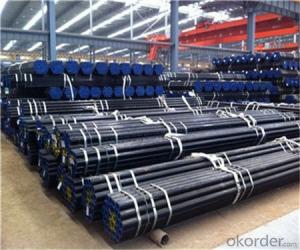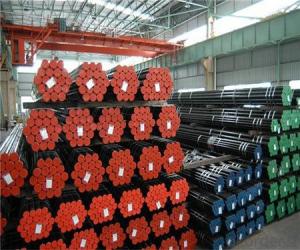Seamless Steel Pipe Low Price Made in China
- Loading Port:
- Tianjin
- Payment Terms:
- TT OR LC
- Min Order Qty:
- 20 m.t.
- Supply Capability:
- 9000 m.t./month
OKorder Service Pledge
OKorder Financial Service
You Might Also Like
1、specific of CS SEAMLESS PIPE ASTM A53/ ASTM A106/ API 5L GR B:
ASTM A106, ASTM A53, ISO3183-2-1996
● Application: To be used for conveyance of petroleum, gas and conveyance of other fluid
1) Material:20#(ASTM A 106/A53 GRB.API5LGRB,GB),45#,16Mn,10#.
2) Specification range:OD:21.3-610mm,WT:6-70mm,length:6-12m or according to the requirement of clients.
Standard: APL SPEC 5CT
● Application:Tubing is used to extracting extract petroleum andnatural gas from a well.Casing serves as walls of well.
2、Main advantage of CS SEAMLESS PIPE ASTM A53/ ASTM A106/ API 5L GR B :
• accuracy of manufacturering is high
• long life good after sales service
• Small inertia resistance High strength
• Strong heat dissipation ability
• Good visual effect
• Reasonable price good quality long life and best service
3、CS SEAMLESS PIPE ASTM A53/ ASTM A106/ API 5L GR B Specification:
Standard | GB, DIN, ASTM ASTM A106-2006, ASTM A53-2007 |
Grade | 10#-45#, 16Mn 10#, 20#, 45#, 16Mn |
Thickness | 8 - 33 mm |
Section Shape | Round |
Outer Diameter | 133 - 219 mm |
Place of Origin | He Bei, China (Mainland) |
Secondary Or Not | Non-secondary |
Application | Hydraulic Pipe |
Technique | Cold Drawn |
Certification | API |
Surface Treatment | factory state or painted black |
Special Pipe | API Pipe |
Alloy Or Not | Non-alloy |
Length | 5-12M |
Outer Diameter | 21.3-610mm |
Grade | 20#, 45#, Q345, API J55, API K55, API L80, API N80, API P110, A53B |
Standard | ASME, ASTM |
4、Packaging & Delivery of CS SEAMLESS PIPE ASTM A53/ ASTM A106/ API 5L GR B
Packaging Details: | seaworthy package,bundles wrapped with strong steel strip |
Delivery Detail: | 30-45days after received 30%TT |
CS SEAMLESS PIPE ASTM A53/ ASTM A106/ API 5L GR B Images:
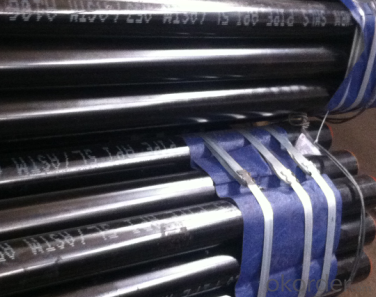
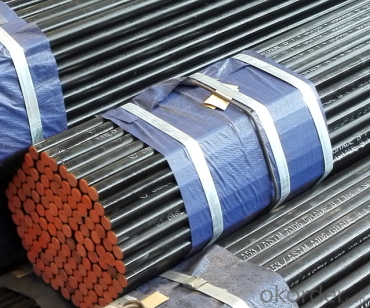
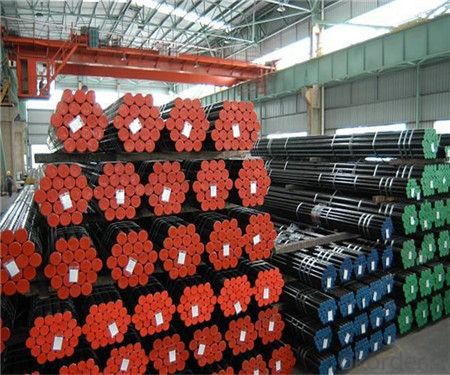
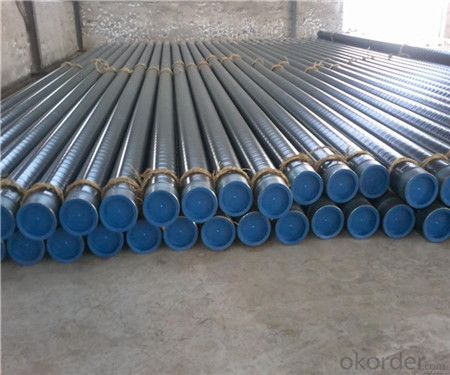
FAQ of Seamless Pipe ASTM A106/53:
①Quality
Our products are manufactured strictly according to national and internaional standard, every pipe will be tested before delivered out. we could provide the quality certifications and all kinds of testing report as long as you need, please just ask us for it.
Guaranteed: we promise 100% refund If products’ quality don’t accord to discription as we give or the promise before you place order.
②Price
we are factory and be able to give you lowest price with the same good quality , and we have a policy that “ for saving time and absolutely honest business attitude, we quote as lowest as possible for any customer, and discount can be given accordinood to quantity”,if you like bargain and factory price is not low enough as you think, just don’t waste your time.Please trust the quotation we would give you, it is professional one.
Why us?
● Professional teams ensure a high efficiency of your purchase
▲ Professional sales team
▲ Professional engineering and technology team
▲ Professional exportation and contract processing/management team
▲ Professional cooperators and partners
SGS test is available, customer inspection before shipping is welcome, third party inspection is no problem.
- Q:What are the different pressure ratings for steel pipes?
- Steel pipes typically have different pressure ratings, which indicate the maximum pressure that they can safely handle. The pressure ratings for steel pipes can vary depending on factors such as the pipe diameter, wall thickness, and material grade. The most common pressure ratings for steel pipes include: 1. Schedule 40: This is the standard pressure rating for steel pipes used in general applications. It is suitable for low to medium pressure systems, with a maximum working pressure of 150 psi (pounds per square inch). 2. Schedule 80: This pressure rating is used for steel pipes that need to withstand higher pressures. It has a thicker wall thickness compared to Schedule 40, allowing it to handle higher working pressures of up to 300 psi. 3. Schedule 160: This is a heavy-duty pressure rating for steel pipes used in high-pressure applications. It has an even thicker wall thickness than Schedule 80 and can handle working pressures of up to 500 psi. Apart from these standard pressure ratings, there are also specialized steel pipes available with higher pressure ratings, such as Extra Strong (XS) and Double Extra Strong (XXS). These are designed for extremely high-pressure systems and have thicker walls than Schedule 160. It is important to note that the pressure ratings mentioned above are for steel pipes specifically. The pressure rating may differ for pipes made from other materials, such as copper or PVC. When selecting a steel pipe, it is essential to consider the required pressure rating based on the specific application and system requirements to ensure safe and efficient operation.
- Q:Why seamless steel pipe called seamless steel pipe?
- Steel pipe is divided into seamless steel pipe and welded steel pipe two kinds: seamless steel pipe is ingot or tube billet, through the perforation made capillary, and then by hot rolling, cold rolling or cold drawn made, so seamless steel pipe is divided into hot-rolled and cold drawn two categories. Welded steel pipe is through the steel plate or steel strip after bending forming, and then welded to make, according to the form of weld is divided into longitudinal welded pipe and spiral welded pipe two kinds. It is obvious that seamless welded pipe has no weld and that welded steel pipe has weld line.
- Q:How are steel pipes coated to prevent internal corrosion?
- Steel pipes are coated to prevent internal corrosion through a process called internal coating. This involves applying a protective layer of epoxy or polyethylene coating on the inner surface of the pipes. This coating acts as a barrier between the steel surface and the fluid being transported, preventing the corrosive elements from coming into direct contact with the steel and reducing the risk of internal corrosion.
- Q:What are the different types of corrosion that can affect steel pipes?
- There are several types of corrosion that can affect steel pipes, including general or uniform corrosion, pitting corrosion, galvanic corrosion, crevice corrosion, and stress corrosion cracking.
- Q:How are steel pipes used in power plants?
- Power plants rely heavily on the extensive use of steel pipes for a variety of purposes. When it comes to transporting fluids and gases, steel pipes are the go-to choice. They effectively carry water, steam, and fuel (like oil or gas) throughout the power plant. The reason steel pipes are so widely used for this purpose is because of their exceptional strength and durability. They can withstand the high pressures and temperatures found in power plants without faltering. Another crucial role steel pipes play in power plants is in the boilers. They are an integral part of the boiler system, responsible for the transportation of hot gases and steam. These pipes are specifically designed to endure extreme heat and pressure, ensuring the safe and efficient operation of the boiler. Moreover, steel pipes are utilized in the cooling systems of power plants. They facilitate the circulation of water to cool down essential equipment such as turbines and condensers. These pipes are built to withstand corrosion caused by the cooling water, all while maintaining the required flow rate and pressure. Additionally, steel pipes find their place in the construction of power plant structures. They are extensively used for fabricating support structures like frames, platforms, and walkways. Steel pipes possess excellent structural integrity and can bear heavy loads, making them the perfect choice for these applications. In conclusion, steel pipes fulfill a crucial role in power plants by efficiently transporting fluids and gases, serving as an essential component of the boiler system, facilitating cooling processes, and providing structural support. Their strength, durability, and resistance to extreme conditions make them indispensable in the operation of power plants.
- Q:What are the common applications of seamless steel pipes?
- Seamless steel pipes have numerous common applications in various industries due to their unique properties. Here are some of the most common applications of seamless steel pipes: 1. Oil and gas industry: Seamless steel pipes are widely used in the oil and gas industry for the transportation of oil, gas, and other fluids. They are preferred due to their high strength, durability, and resistance to corrosion, making them suitable for harsh environments. 2. Construction and infrastructure: Seamless steel pipes are extensively used in construction projects, including the construction of buildings, bridges, and tunnels. They are ideal for structural applications due to their ability to withstand heavy loads and provide excellent strength and stability. 3. Automotive industry: Seamless steel pipes are a crucial component in the manufacturing of automotive parts, such as exhaust systems, engine components, and hydraulic systems. They offer high strength, reliability, and resistance to heat, making them suitable for demanding automotive applications. 4. Mechanical and engineering applications: Seamless steel pipes find usage in various mechanical and engineering applications, including machinery, equipment, and manufacturing processes. They are commonly used for carrying fluids, gases, and steam, as well as for the transmission of power in machinery. 5. Power generation: Seamless steel pipes are extensively used in power plants for the transportation of steam and hot water. They are capable of withstanding high pressure and temperature, making them ideal for power generation applications. 6. Petrochemical industry: Seamless steel pipes are crucial in the petrochemical industry for the transportation of various chemicals, gases, and liquids. They have excellent resistance to corrosion, which is essential when dealing with hazardous and corrosive substances. 7. Mining industry: Seamless steel pipes are used in the mining industry for various applications, including the transportation of slurry, water, and other mining-related fluids. They offer durability, reliability, and resistance to abrasion, making them suitable for the challenging mining environment. 8. Aerospace industry: Seamless steel pipes find applications in the aerospace industry for manufacturing aircraft components, such as hydraulic systems, fuel lines, and structural parts. They provide high strength-to-weight ratio and resistance to extreme temperatures and pressure. Overall, the common applications of seamless steel pipes span a wide range of industries, thanks to their exceptional properties, including strength, durability, resistance to corrosion and high temperatures, making them an essential component in various industrial processes and infrastructure development.
- Q:How are steel pipes used in the manufacturing of machinery?
- Steel pipes are commonly used in the manufacturing of machinery for various purposes such as conveying fluids, gases, or solids, and providing structural support. They are used to transport materials within the machinery, including coolant, lubricants, and gases. Steel pipes also play a crucial role in creating the framework or structure of machinery, providing stability and strength. Additionally, they are used for creating pneumatic systems, hydraulic systems, and exhaust systems in machinery.
- Q:What are the different methods of pipe cutting for steel pipes?
- There are several methods of cutting steel pipes including manual methods such as hacksaw cutting and abrasive cutting, as well as more advanced methods like plasma cutting, laser cutting, and water jet cutting. Each method has its own advantages and is selected based on the specific requirements of the project.
- Q:Can steel pipes be used for underground steam pipelines?
- Yes, steel pipes can be used for underground steam pipelines. Steel pipes are known for their durability and high temperature resistance, making them suitable for transporting steam underground.
- Q:Can steel pipes be coated for additional protection?
- Yes, steel pipes can be coated for additional protection. Coating the pipes helps to prevent corrosion, enhance durability, and improve resistance to various environmental factors.
1. Manufacturer Overview |
|
|---|---|
| Location | |
| Year Established | |
| Annual Output Value | |
| Main Markets | |
| Company Certifications | |
2. Manufacturer Certificates |
|
|---|---|
| a) Certification Name | |
| Range | |
| Reference | |
| Validity Period | |
3. Manufacturer Capability |
|
|---|---|
| a)Trade Capacity | |
| Nearest Port | |
| Export Percentage | |
| No.of Employees in Trade Department | |
| Language Spoken: | |
| b)Factory Information | |
| Factory Size: | |
| No. of Production Lines | |
| Contract Manufacturing | |
| Product Price Range | |
Send your message to us
Seamless Steel Pipe Low Price Made in China
- Loading Port:
- Tianjin
- Payment Terms:
- TT OR LC
- Min Order Qty:
- 20 m.t.
- Supply Capability:
- 9000 m.t./month
OKorder Service Pledge
OKorder Financial Service
Similar products
New products
Hot products
Related keywords
